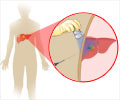- DNA-based liquid biopsies offer quicker detection for liver cancer.
- They are minimally invasive.
- They represent the entire molecular picture of a patient's malignancy.
HCC is the most common type of primary liver cancer in adults and among the leading causes of cancer mortality in the world, with more than 780,000 new cases and 740,000 deaths each year. More than 40,000 new cases are diagnosed in the United States annually, with approximately 29,000 deaths annually. Liver cancer incidence rates are rising.
Like many cancers, early detection improves prognosis and survival rates, in part due to greater efficacy of localized treatment versus systemic treatments. But current detection methods for HCC primarily rely upon imaging and a blood test for a non-specific tumor marker called alpha-fetoprotein (AFP), which is usually elevated when the disease is significantly advanced.
DNA Methylation
Changes of DNA methylation widely existed in tumors and played an important role in tumor progression. Abnormal methylation occurs before cellular canceration and throughout all stages of malignant transformation, which have the characteristics of tissue specificity and long-term stability; thus, detection of aberrant gene methylation could serve as a potentially powerful approach for early diagnosis of tumors, such as lung cancer and breast cancer.
In their study, Zhang and colleagues looked at hundreds of thousands of methylation profiles of HCC patients and healthy controls. The researchers identified a specific panel of methylation markers that correlated to HCC, then used a variety of machine learning and statistical methods to examine their efficacy at detecting and assessing HCC in 1,098 HCC patients and 835 normal controls.
DNA methylation is a process that can regulate gene expression and extensive DNA methylation of a gene usually leads to a gene being turned off. Increased methylation of tumor suppressor genes is an early event in tumor development, suggesting that altered DNA methylation patterns may be a good indicator of an emerging tumor.
Non-invasive blood tests or liquid biopsies present a better alternative. Many liquid biopsies work by detecting circulating tumor DNA (ctDNA), which are fragments of genetic material shed into the blood by tumor cells. These biopsies offer several potential advantages over other methods of cancer detection, according to Zhang. They are minimally invasive. They can be done at any time during therapy, allowing physicians to monitor molecular changes in tumors in real-time. They may detect tumors not apparent or indeterminant based upon imaging. And finally, ctDNA potentially represents the entire molecular picture of a patient's malignancy while a tumor biopsy may be limited to just the tested portion of the tumor.
"Our results were very encouraging," said Zhang. "In a large clinical cohort, our blood-based HCC diagnosis highly correlated with tumor burden, treatment response and stage of cancer. Right now, oncologists are quite limited in how they detect HCC and evaluate treatment. Our study is a great demonstration of proof-of-concept for a new, more effective approach that applies to solid malignancies, HCC and beyond."
- Rui-hua Xu, Wei Wei, Michal Krawczyk et al. Circulating Tumour DNA Methylation Markers for Diagnosis and Prognosis of Hepatocellular Carcinoma, Nature Materials doi:10.1038/nmat4997
Source-Eurekalert















